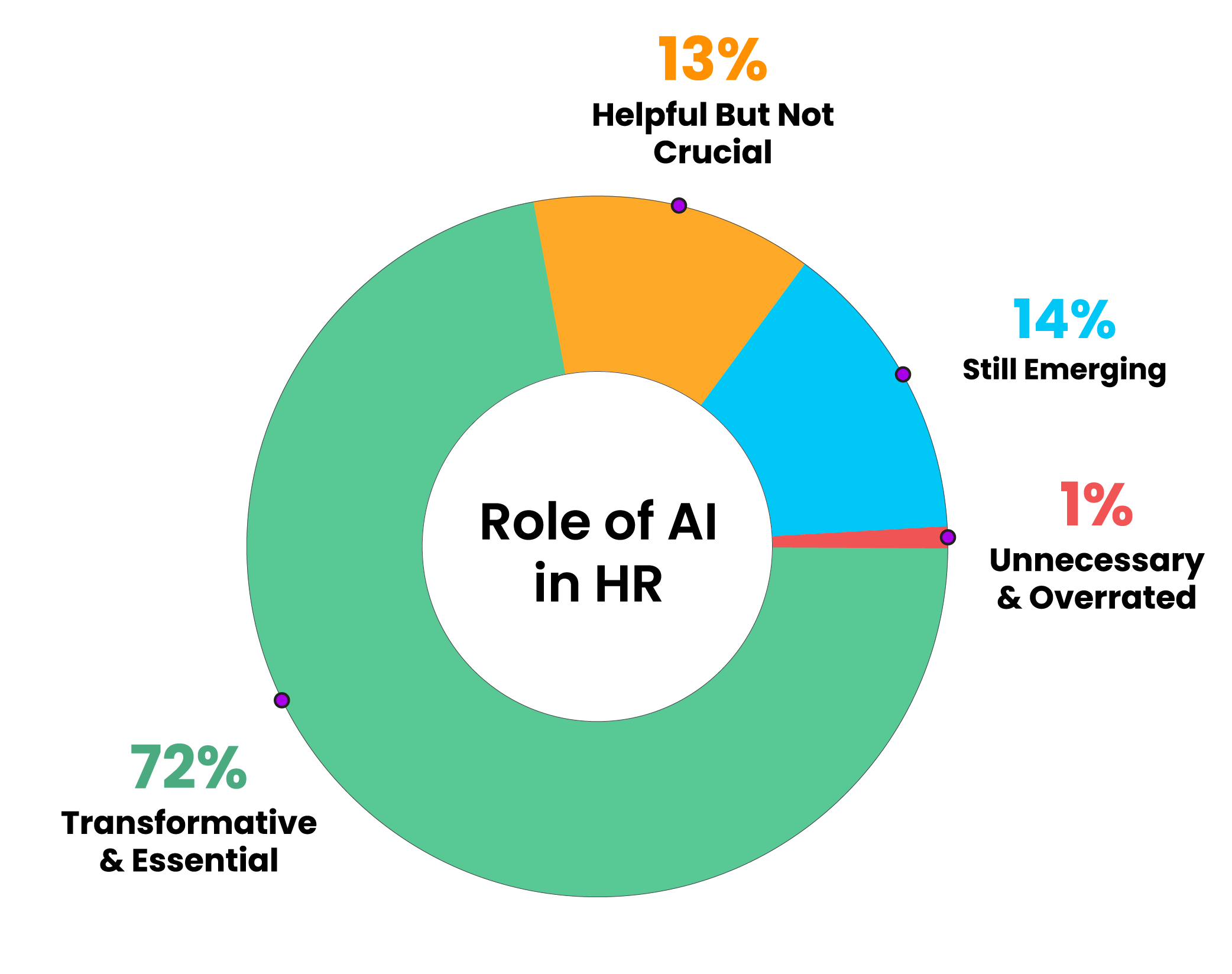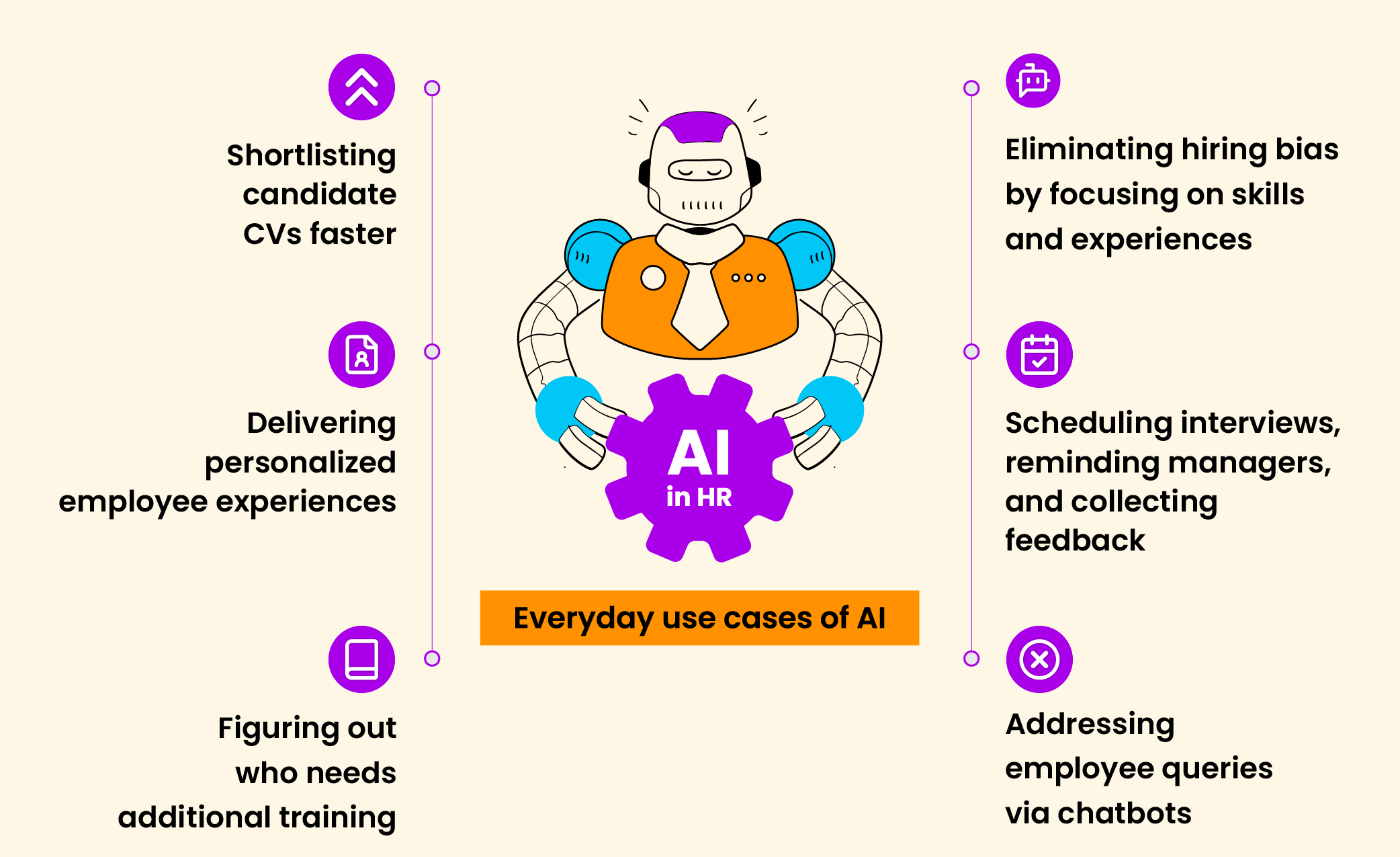In a greytHR Parichay poll on the Role of AI in HR, 72% of the attendees said it’s transformative and essential. However, only 1% felt that it was unnecessary and overrated.

AI has become a game changer in almost every business function, including human resources (HR). It’s transforming how organizations manage their workforce, streamline operations, and make business-critical decisions. Stated simply, AI-enabled HR is about working smarter and being more strategic to enhance HR productivity and employee experience.
AI helps automate repetitive tasks such as resume screening, interview scheduling, and employee onboarding, to name a few. This automation not only speeds up such tasks but also eliminates human errors and cuts down on manual work. The result? HR professionals can focus more on strategic initiatives.
Applying AI in HR Management
AI is not going to disrupt anything in a negative way. In fact, it will empower HR teams by making processes faster, easier, and more accurate. AI will eventually help organizations stay ahead in the rapidly evolving business landscape. Here are a few everyday use cases of AI in HR management.
- Shortlisting candidate CVs faster
- Delivering personalized employee experiences
- Figuring out who needs additional training
- Addressing employee queries via chatbots
- Scheduling interviews, reminding managers, and collecting feedback
- Eliminating hiring bias by focusing on skills and experiences

Challenges of Integrating AI in HR Management
Data quality: The effectiveness of AI depends on the quality of the data that’s fed in. If the data is biased, the output will also be biased. Hence, both predictions and decisions depend on the input.
Transparency and explainability: HR decisions can significantly impact people’s careers. Although AI speeds up tasks, people don’t fully understand how the algorithm helps make
these decisions.
Data privacy: AI systems require a lot of personal data to function effectively. This raises concerns about how that data is being used and whether the organization complies with data protection regulations.
AI integration in HR: Integrating AI into an existing HR system can be challenging, especially if the former is not AI-ready. This calls for new investments in tools and staff training to optimize the use of AI in HR management.
Resistance to change: People are wary of technologies that have the potential to disrupt their jobs. So, it’s crucial to make them feel comfortable by communicating the message that AI is intended to complement human work and not replace humans.
Change management: Change happens fast and often, especially in this AI-driven era. Keeping pace with technological change is a tall order, but it is necessary. Therefore,
it is important to build a culture of adaptability while encouraging continuous learning
Cost factor: While AI has the potential to transform HR processes, it’s not without any challenges. Moreover, not all AI solutions are affordable to all companies. Besides the migration and subscription costs, maintenance costs are also involved in keeping the systems running.
Strategies to Overcome Challenges
Maintaining data privacy: Whenever HR team members collect data from candidates or employees, it is important to let them know the purpose and usage. Also, only the essential data has to be collected. Name IDs and role-based access to this data will help ensure privacy. It’s also good practice to document the whole process to avoid confusion or litigation in the future.
Ensuring transparency: AI-driven HR processes must be transparent and fair at all times. Regular audits help eliminate partiality. Outcome disparities, if any, should be addressed immediately. Also, decisions made by AI have to be reviewed and substantiated for better transparency.
Involving diverse teams: Two heads are better than one! So, it is important to bring different perspectives to reduce the likelihood of biases creeping into the AI system. This helps minimize opposition and rework after the initiative is rolled out.
Taking employee feedback: Some people may feel that an AI decision is unfair and biased. So, it is important to create a channel for them to share their feedback and experiences. When they know where an AI tool is being used, in recruitment, assessment, or another process, they begin to trust the process and outcome.
Practical Steps for Implementing AI
Identify the focus areas: The stakeholders and HR must identify the possible use cases of AI ‒ candidate screening, data management, content development, query management, or employee engagement. It is always good to start small and grow the usage steadily and effectively.
Choosing the right tool: The Indian HR tech market is replete with HRMS solutions. Even the number and types of modules within these solutions vary. So, it is imperative to choose a solution according to the needs of the business. However, the primary focus must be on productivity enhancement.
Training team members: Deployment is not the end; it is just the beginning. Team members have to be trained to use the deployed tool regularly and consistently. It is also critical to monitor the impact of the training.
The Future of AI in HR
AI is predominantly used in areas like resume screening or chatbot-based query handling, among other repetitive functions. Modern HR teams have already started using AI to craft employee communication, identify skill gaps, obtain training recommendations, and perform people analytics for better workforce planning. AI is expected to become deeply integrated with the entire HR lifecycle. HR will start using it for more strategic initiatives that help drive business growth. The number of use cases will also increase. To conclude, AI is not a fad but a powerful phenomenon that is all set to transform the way HR and other functions operate.
This blog is based on the perspectives of greytHR’s Parichay webinar speakers:
- Fasiha Sayad, Director – Head of People Excellence, SISA
- Sanketh Ramkrishnamurthy, Head HR, AutoRABIT
Want to hear it directly from the experts?
Watch the Webinar Recording 👇








